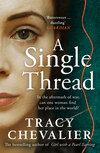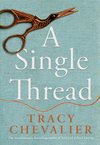Kitabı oku: «A Single Thread», sayfa 5
Chapter 6
VIOLET HAD NO IDEA whom to teach the stitches to. Her mother would never agree, Evelyn had too much to do, and Marjory was probably too young to master anything as complicated as the rice stitch. For a moment she wondered about her landlady, but Mrs Harvey did not seem the type to sit down with a needle. She might be able to convince one of her fellow lodgers, but wasn’t sure she wanted to. Violet had been careful to maintain her distance from Miss Frederick, an English teacher at a local girls’ school, and Miss Lancaster, who worked as a clerk at Winchester Crown Court. There was a certain kind of misery that hung about them, a wistfulness she hated to think clung to her as well. To become friends with them would only make that feeling more pronounced. Still, when several days had passed and she had still not found someone to teach, she realised she would have to break her ban and ask Miss Frederick. She pondered this one morning as she sat typing, two days before the next embroidery class. Her office mates had not yet arrived: they were rarely on time.
Mo sloped in as Violet was midway through her second contract, adding fire insurance to an existing policy on a house in Andover. Mo was never as loud and confident when Olive was not with her. Now she seemed even more downcast: head low, she muttered a hello into her collar and did not look up. Her dress mirrored her mood, puddle-brown, with a shapeless skirt and too much fabric hanging at the chest. Violet nodded hello, and after finishing the contract offered to make tea.
“Yes, please,” Mo answered in a small voice, and sighed. The sigh was the opening, her way of indicating that she was ready to be quizzed about what was wrong.
First Violet went to the kitchen and made a pot of tea, then brought it back to the office with a plate of Garibaldi biscuits – no one’s favourite, but that was all there was. “Right,” she said, placing a cup of tea in front of Mo and handing her the sugar bowl. “What is it?” She sat back in her own chair, hands on her cup to warm them, for it was one of those rainy June days that felt like early spring rather than summer. A cardigan day – she alternated between beige and tan. Today she wore tan; though she couldn’t afford new, she’d recently refreshed it by changing the buttons to a mother-of-pearl set she’d found in a secondhand shop.
Mo heaped several spoonfuls of sugar into her tea and frowned at the rectangular Garibaldis with their currants that looked like squashed flies. Violet did not press her. They had all day.
“O’s handing in her notice,” she said at last. “Effective immediately. Her mother is ringing Mr Waterman this morning.” She picked up a biscuit and took a vicious bite.
“I see.” This was not what Violet had been expecting. She’d assumed that Mo was moping because of something the bank clerk boyfriend had said or done, and that Olive was out on an errand for the long-off wedding – meeting with a vicar, finding a printer for the invitations, looking at dress fabric – using it as an excuse for a leisurely day out. Violet had expected there to be months, years of this nonsense before the big day itself. Only then would Olive leave; women always left work once they married, but not usually before.
“I may as well tell you – you’ll hear soon enough. People are such gossips,” Mo added, conveniently ignoring how much she and O discussed and spread rumours. “She’s – well, she’s getting married soon. Next weekend.”
“Ah.” Violet pushed at a pen on her desk so that it was square with a stack of paper. There was only one reason why a woman got married so quickly.
“It’s not what you think!”
Violet waited a moment, then said quietly, “Of course it is. Poor Olive.”
Mo stiffened, as if about to argue, but after a moment she slumped back in her chair and dunked the biscuit in her tea. “It’s not as if she didn’t want to marry him. Just not so soon, with everyone – talking.”
Violet lit a cigarette and felt old. “They’ll get over it.” And they would. Olive and her man would marry: “We just decided we wanted no fuss, just to be together, because we love each other so,” she would say. She would have her baby: “Premature, but look what a big bouncing thing he is anyway; you’d never guess he came two months early!” And people would forget the circumstances, because it happened often enough, and what did it matter anyway? Violet had been careful with her sherry men, using a Dutch cap she’d convinced a married friend to get for her from a doctor. But she’d had a few scares over the years, and knew how easily a girl like Olive could be caught out. At least her fiancé was being honourable. If he was anything like his sister Gilda, Violet suspected O was very lucky indeed.
At lunch it was raining too hard to go out, and Violet and Mo remained at their desks with their sandwiches, Mo flicking miserably through a magazine.
“I say,” Violet finally suggested, “shall I teach you something that will take your mind off of things?”
It turned out that Mo – or Maureen, for along with Olive’s abrupt departure went the nickname – was better at embroidery than Violet, even though she had never done it before. She had the knack of remaining focused and somewhat dogged – qualities Violet had never seen her display while typing. But then, Olive had always been around to distract her. She was also easily pleased with the results. “Look at my rows of Gobelin,” she announced possessively as they sat stitching. “Straight as straight!”
Miss Pesel was right: teaching someone else did help you to learn the stitches yourself, as your pupil’s questions forced you to think through why you were doing what you were doing, and expose the things you didn’t really understand. “Why does the tension matter so much?” Maureen demanded as she frowned at her green wool.
“Because – look –” Violet pointed at a rogue stitch – “see how that sticks out? You haven’t pulled it tight enough. It will always be like that, unless you unpick it.”
“Why does it matter if the stitches on the back are straight or diagonal?”
“Because stitches on the diagonal pull the canvas so it’s distorted. You want the cushions and kneelers to be squared.”
“And why must the back be so neat?”
“If there are too many loose threads you may accidentally pull them through the front with your stitches.” Violet could feel herself parroting Miss Pesel. So far she had managed to answer all of Maureen’s questions, but she expected eventually to be caught out.
“Perhaps you should come along to the meeting before the broderers break for the summer,” she suggested as they stitched again during their afternoon tea break. It was a remarkably quick transition from being ignored and pitied to becoming Maureen’s teacher, and even suggesting an activity together. She could not picture them ever being good friends – Maureen was fifteen years younger – but the atmosphere in their office was already transformed.
“Mr Waterman won’t let us both go,” Maureen replied, holding her canvas piece close to her face to peer at her stitches. She was practising rice, with two different colours of wool. “Oh, blast! I forget which direction to take the overstitches in. Does it matter, clockwise or anti-clockwise?”
“No, as long as you stitch each square the same way, so it’s consistent.” Violet studied her own rice stitches. There seemed to be a lot of canvas showing. “Mr Waterman might let us go for the morning if we work through lunch and stay late to make up some of the hours.”
“With Olive gone, he’ll need to hire someone else sharpish.”
Violet had an idea about that but kept quiet to allow the thought to mature.
Evoking her seemed to conjure up Olive herself, for Violet heard the distinctive click of her heels down the hall. Maureen – or perhaps she was back to Mo – looked up in panic. Throwing down her embroidery, she grabbed a magazine and her cup of tea, and turned her face away. Violet was more amused than hurt.
But Mo was not clever enough to conceal her new hobby. Olive appeared in the doorway, still looking like a sturdy, curvy pony, took in Maureen’s awkward pose behind the magazine, glanced at the embroidered sampler on her desk and the one Violet was holding, and snorted. “The second I leave you join the arty-and-crafty lot!” she smirked. “What’s this?” Before Mo could stop her, she’d picked up the sampler. The needle slid off the wool and tinkled on the floor.
“Tent, Gobelin, rice, cross, and long-armed cross,” Violet replied for Mo. “She’ll learn eyelets shortly.”
Olive dropped the embroidery as if it were infectious. “Knitting like an old maid!” she cried, gazing down on her erstwhile friend. “What’s happened to you?”
Mo lowered her magazine. “You left,” she said quietly.
“So? I was always going to leave once I got married. It’s just a little sooner, that’s all. You’ll leave too, one day.” Olive looked around and spied her bright chiffon scarf hanging on a hook on the back of the door. “There you are!” she announced in triumph, snatching it up. “Couldn’t leave you behind, could I?”
“I’ll still be your maid of honour, won’t I?” Mo’s voice was small and pleading. “Next week?”
“Oh, that. I don’t think so.” Olive spent a great deal of time tying the scarf around her neck and getting it to hang right. “It’s just a small, intimate wedding. Family only.”
Mo looked so miserable at this that Violet felt the unusual desire to intervene. “We are not knitting, actually,” she said. “We’re doing canvas embroidery. The contemporary version of spinning, you might say.” At Olive’s puzzled frown, she added, “Spinning wool. That’s where ‘spinster’ comes from.”
Olive rolled her eyes. “Lord, I’m glad I won’t be caught up in any of that.”
“Well, best of luck,” Violet remarked in her briskest voice, “with that.” She nodded at Olive’s still-flat belly.
Olive started, and turned bright red. “I don’t know what you mean! Really, that’s—” She stopped. Under the flush on her cheeks, she seemed to go green. “Just going up to wash!” She turned and hurried down the hall towards the lavatory.
With another kind of girl, Violet might have made fun of Olive and her abrupt departure. But she knew Mo would not laugh, especially not with the background accompaniment of Olive’s distant retching. Instead she said gently, “Shall we move on to eyelets?”
After a moment Maureen leaned down to look for her needle on the floor. “Yes.”
Violet fortified herself with a tea biscuit, then went to speak to Mr Waterman. It was best if she laid out her ideas all in one go – the work and the broderers’ classes and Maureen. She was not one to make suggestions at work, but she had not needed to when she lived at home and did not have to pay for her upkeep. If she did not say something now while there was an opportunity, she would slowly starve.
When she knocked on his open door Mr Waterman was gazing out of the window at the rain. “Hello, Miss Speedwell, I was just admiring the rain. The garden needs it. Now, what can I do for you? Is that a cup of tea you’ve brought me? Just the ticket, thank you! Take a seat.”
Violet knew little about her supervisor’s personal life other than that he had a wife and child he never talked about, he liked cricket, and he did not like hot weather. She didn’t know what he had done during the War. She could not make small talk with him based on so little. Now as he sat sipping his tea, she chose her words carefully. “Thank you very much for allowing me to take time off to attend Mrs Biggins’ embroidery meeting last week,” she began.
At the mention of Mrs Biggins, Mr Waterman sat up straight. “Of course, of course. She was happy, was she? Happy to teach you?”
“Yes, indeed. In fact—”
“But wait: weren’t you ill that afternoon? She didn’t make you ill, did she?”
Violet thought quickly. “No, it was the heat. The room was a bit stuffy.”
“Ah, the heat, yes. We’ve been having some scorchers, eh? Not today, though.”
“I should have sat by the window. Next time I shall ask to do so.”
“Next time? Didn’t she teach you what you needed to know?”
“Mrs Biggins would like me to come once more before they break up for the summer, just to make sure I know what I’m doing. And I’m to bring Maureen as well.”
Mr Waterman’s brows shot up. “Miss Webster?”
“Mrs Biggins is keen to have more broderers for the Cathedral work. It seems Miss Webster is quite adept at embroidery.”
“I see.” Mr Waterman drummed his fingernails against the tea cup in a rapid tink-tink-tink. “Mrs Biggins says that?”
“Mrs Biggins has not seen her work yet,” Violet admitted, for she knew she could only stretch a lie so far. “But she and Miss Pesel – who founded the Winchester Cathedral Broderers – have said more good workers are needed. And Miss Webster’s work is exceptional.” That was an exaggeration, but Mr Waterman would not know if he looked at Maureen’s sampler; it would seem like hieroglyphs to him, just as embroidery had seemed to her only a week ago.
“Well, far be it from me to stand in the way of good work for the Church,” Mr Waterman began. “But there is a problem, what with Miss Sanders’, er, sudden departure.” He gulped down the last of his tea; drops of it hung from his moustache. Olive’s mother might have spun a tale of young impetuous love unable to wait to marry, but Mr Waterman clearly knew what was what.
“I have a suggestion to make about that vacancy,” Violet said.
“You do?” Mr Waterman made no attempt to hide his astonishment – astonishment tinged with disapproval. She would have to hurry to lay out her plan before his annoyance at this female temerity shut down the conversation.
“I was going to suggest that Miss Webster and I handle some of the extra work between ourselves. Miss Sanders was a nice girl, but not the fastest of typists. If I take a shorter lunch break of just half an hour, and work an extra hour on the weekdays, that’s seven and a half hours a week more. I can’t speak for Miss Webster, of course, but she may want extra hours as well. Then you could hire a part-time typist to make up the difference. And perhaps you’ll find you don’t even need that.” Violet was being polite. Olive was a terrible typist and a lackadaisical employee. Maureen would no longer be distracted by her friend, and together they would more than manage the existing work. But she could not say so.
“You would do that? You would really work more hours for Southern Counties Insurance?” Mr Waterman’s gratitude alarmed her; clearly he had misunderstood a crucial element.
“Of course I would be glad for the rise in pay,” she rejoined. “Very glad. It is not easy for a single girl to live on my current salary.”
“The rise in pay?” Mr Waterman’s voice rose alongside his thoughts. He wiped his forehead with a handkerchief.
Violet could have said: “Of course, foolish man. Why would I do more work for no pay? Do you know what I eat at lunch? That I never have a hot meal? That my clothes hang off me because I’ve lost weight and can’t afford to buy new? That I either eat or go to the cinema? That I have no pension and no husband to keep me and my savings are being decimated? That I often wonder what will happen when I am too old to work? That I don’t dare ask my brother for money because I have good relations with him and want to keep it that way so that I can rely on him and his children to help me when I’m old?”
She said none of those things to Mr Waterman. “It will save Southern Counties money in the long run,” she explained, “not having to pay a third typist’s full salary.”
“Yes, I suppose that’s true,” Mr Waterman conceded after a moment. The tide of his disapproval was slowly diminishing.
It rose again when she suggested her and Maureen’s salaries increase by four shillings a week each, and remained high as she patiently took him through the numbers and explained her calculations. “You’ve clearly given this some thought, Miss Speedwell,” he muttered, obviously displeased with this idea.
But when Violet reminded him several times that there would be a saving of Olive’s salary minus this increase – provided she and Maureen were more efficient – he reluctantly agreed to set forth this solution to his seniors in Southampton. “But, Miss Speedwell, I shall say this idea came from me, if you don’t mind,” he added with a frown. “I can’t think what management would say about a girl having such a … progressive idea.”
Violet did not expect a response for some time, reasoning that it would take Mr Waterman a week or two to come round to the idea and in a sense make it his own. She didn’t mind if he did so, as long as she got a pay rise. That night as she sat in the front room, listening to Gracie Fields on the wireless, she dreamed of chops.
So she was surprised when two days later he appeared in their office while they were typing – Maureen indeed much faster now that Violet was setting the pace – and announced that Southampton had agreed they would take on Olive’s work as a trial run for a month.
“With an additional four shillings a week?” Violet felt she had to ask.
“Yes, yes, Miss Speedwell, with the additional four shillings.” Mr Waterman looked weary, as if imagining he might have to field this sort of demand from his wife or daughter.
After he left they continued to type in silence. But when Violet glanced over, Maureen was smiling.
Violet celebrated by going to Awdry’s Tea Rooms on the High Street for lunch, where she had three courses: leek and potato soup, a pork chop with two bread rolls, and spotted dick with extra custard. She scraped every dish clean.
Chapter 7
AT THE FINAL EMBROIDERY class, Violet was set to work over the summer making borders for cushions: an inch-wide strip of blue, yellow, and red geometric patterns that would create the sides of the cushions being made for the choir seats and benches. “You can’t do too much damage there and you won’t need a frame,” Mrs Biggins had declared, still treating Violet as a nuisance rather than a help. It was true, however, that the borders wouldn’t be much seen; people would be admiring the history medallions that went on top.
She was given a model of the repeating pattern, canvas, needles and enough wool to make several yards of border. Gilda nodded at the model, which was beautifully, evenly stitched. “Miss Pesel will have whipped that up in half an hour!”
Violet sighed. Gilda was doubtless right, but it reminded her of how slow her own work was.
She became a little obsessed with embroidery. Stealing an old needle case from her mother, she kept it permanently in her handbag, along with a length of border, so that she could work on it whenever she had time. At the office she stitched during tea breaks and after lunch. She stitched on the train to and from Southampton on Sundays. At night after supper she began to spend the evening in the front room with the other residents, listening to the variety shows on the wireless, and working on long strips of borders. It was less awkward sitting with others when she had something to do with her hands. Miss Frederick corrected her pupils’ essays on Tennyson or The Canterbury Tales or made lesson plans for the following term, Miss Lancaster read magazines, and Mrs Harvey did her usual popping in and out – though she would stop and listen if Al Bowlly was singing. “He’s quality,” she’d declare, and sing along to her budgies.
Violet found stitching similar to but more satisfying than typing. You had to concentrate, but once you were skilled enough, you could settle into it and empty your mind of all but the work in front of you. Life then boiled down to a row of blue stitches that became a long braid across the canvas, or a sunburst of red that became a flower. Instead of typing in forms about people she would never meet, Violet was making bright patterns grow under her fingers. She began to dream of stitching, of the close square holes of the canvas, of blocks of yellow braid, of red rice stitches and pink Gobelin in even rows.
At work Maureen often stitched alongside her during breaks. She had fitted right in at the Cathedral Broderers’ class, proving surprisingly adept at handling Mrs Biggins by abasing herself before the older woman, agreeing that she was the biggest nuisance for appearing so late in the year and that yes, she would be nothing but trouble, and that no, she didn’t know why Mrs Biggins bothered with her. Then she rolled her eyes behind the teacher’s back as if they were all back at school, and made the younger broderers laugh. Even Mabel Way smiled at her exaggerated expressions. By the end of the session she was on her way to replacing Olive with new friends. Violet was astonished at the transformation from plain, downtrodden office worker to confident stitcher larking about with others.
Her co-worker had also pulled ahead and was now giving back advice on embroidery. “Blimey, Violet!” she cried one afternoon over cups of tea. “When you’re unpicking, don’t pull through two holes at once. You’ll shred the wool and won’t be able to use it again. Pull it out through a hole, then turn the canvas over and pull it out through the next.”
Violet frowned. Unpicking was so dispiriting, like having to retrace your steps after leaving home because you’ve left behind your purse. But mistakes showed up all too easily, though the gaping hole from a missed stitch was not always noticed until rows later. Violet didn’t dare leave the mistakes, knowing they would be noticed by Miss Pesel and have to be fixed.
Without the classes, she turned to Gilda for advice, and they began meeting regularly at Awdry’s for coffee at lunch or after work to discuss embroidery, though they strayed into many other topics. Gilda was such a talker that Violet found she rarely had to ask questions. Her new friend was unswerving in her support for Violet’s new life in Winchester, and it made her grateful to be encouraged to feel less guilty about leaving her mother. Gilda had her round to the Hills’ for tea one night, wrecking the kitchen in her quest to make the perfect shepherd’s pie for her guest. It was delicious, but Violet had to eat it under the baleful eye of her old office mate Olive, now installed as the newest Hill, swelling with the next Hill. She preferred to see Gilda elsewhere, at Awdry’s or the cinema or sunning themselves out on the Outer Close.
During the summer Violet also began to visit the Cathedral more often – for practical reasons rather than for spiritual sustenance, to study the kneelers now in use in the choir and presbytery and check her border stitching against them. Gradually she became aware of some of the daily activities taking place there. There was a bustle to the building that had nothing to do with prayer and contemplation. It was more like Plummers, the Southampton department store where she went to buy stockings or gloves or bath salts. Plummers seemed to be filled with shoppers, yet when you looked more closely, there were clerks everywhere, folding clothes, setting out samples, pushing trolleys full of merchandise, sweeping the marble floors. Occasionally when a ’flu epidemic temporarily reduced staff numbers and dustballs accumulated in the corners and clothes were left in untidy heaps, it became clear how much Plummers relied on its workers to keep it running smoothly.
Violet suspected it was the same with the Cathedral workers who, apart from the vergers, were mostly volunteers. There were the ladies arranging flowers in stands under windows and by pillars. There was the man setting out candles for lighting at shrines, and scraping away the old wax from previously lit candles. There was the woman laying out kneelers on the chairs in the presbytery, squaring them so that they sat even. There were two old men gathering up the prayer books and storing them in boxes. There was the man polishing the brass candlesticks on the altars, and another mopping the mediaeval tiles in the retrochoir. There were the two women who called themselves the Holy Dusters, going around and wiping down every possible surface. There were the vergers, rushing past with a jar of communion wafers, a green robe, a Bible.
One evening after work, Violet sat in the presbytery, inspecting a kneeler to see how the broderer had blended the blues, and considering how to do the same with the yellows in the borders she was working on. As she pulled at the stitches, someone took the seat next to her. She was startled to find it was Louisa Pesel, and let out a little yelp, then apologised.
Miss Pesel smiled. “I like to come here sometimes just to sit and look.”
Violet nodded. It felt like having a member of the Royal Family choose to sit by her, though one wearing a brown turban trimmed with a tuft of feathers.
“Sometimes I wonder if we couldn’t use even more colour here. It’s so dark – especially in the choir stalls.” Miss Pesel nodded at the wood stalls to their left. “The stone and wood just soak it up, even the mustard yellow some are complaining about.”
“People are complaining?”
“Oh, yes.” Miss Pesel’s laugh was like a low bell ringing through the presbytery. “They say it’s vulgar and inappropriate in a religious setting. Not Dean Selwyn, of course. He has always been on our side. Indeed, it was he who asked me to organise making these cushions and kneelers, having seen those I’d made for the chapel at Wolvesey House. I didn’t stint on colour there. He knew what he would be getting, and he hasn’t wavered in his support.”
“Have you always embroidered?”
“Since I was a girl, yes. And then I taught it – here and abroad – and that rather set me on the path for life.”
“Abroad?”
“I taught embroidery in a girls’ school in Greece for several years. I became something of an expert in Greek embroidery.”
“Gosh.” Miss Pesel seemed so English that it was hard to imagine her in a foreign climate – gently perspiring in blazing sun, teaching a class of Greek girls the rice stitch or long-armed cross in a stark white building against a background of bright blue sea and sky. Violet wanted to ask about a husband, but didn’t, for that was the question she most hated being asked herself.
“I travelled a bit too,” Louisa Pesel continued, smiling at the memories. “To Egypt, to India. Glorious. I even rode a camel once! Then during the War I was back in Bradford—”
“Bradford?”
“Indeed. I grew up in Bradford. During the War I taught embroidery there to convalescent soldiers. Do you know, Miss Speedwell, sewing can be so therapeutic when one has had trauma. The bold colours and the repetition of simple stitches had such a soothing effect on the men. There was something about creating a thing of beauty that worked wonders on their nerves. I was very pleased with the results.”
Violet had a vision of George and Laurence sitting in a muddy trench, stitching a row of red eyelets, and shuddered.
Louisa Pesel didn’t seem to notice, or was too polite to say. “So, is that yours, Miss Speedwell?” she asked, nodding at the kneeler in Violet’s lap. “I know the broderers like to come and visit their work in situ, as it were.”
“No, I was looking at others’ work to see how they handled blending colours.” Violet was pleased that Miss Pesel remembered her name.
“Which pattern are you working on over the summer?”
“Oh, I’m not making a kneeler. Mrs Biggins has assigned me to make borders for the cushions. Lengths and lengths of borders.”
“Have you made your sampler?”
Violet nodded.
“And taught the stitches to someone else?”
“Yes. In fact, she has now joined the broderers.”
“And would you like to make a kneeler?”
“I would.”
“I’m curious, Miss Speedwell. Why? There will be over three hundred kneelers, so yours would get lost in the crowd. Whereas there will be far fewer cushions, and they’ll be very striking, and the borders of course will be essential to making them three-dimensional. There is no shame in sewing borders.”
“I know. It’s just—” Violet stopped.
Miss Pesel said it for her. “You want to make something wholly yours that will be properly seen and used.”
“Yes.”
Miss Pesel was looking at her expectantly, as if she had handed her a book to read from. Violet realised she was expected to explain herself more fully, though she had not really thought it through. “I grew up in Southampton,” she began, “and we attended St Michael’s. My mother still does.”
“I have been. A handsome church.”
“Although I have gone all my life – to Sunday school, for communion classes, to Sunday services – I have never truly been at home there. Especially not after – not after my brother’s death during the War. The service for him felt perfunctory. The vicar had performed so many of those services that he could have done it without any notes. He knew George, but he led the service as if it meant nothing.”
She stopped.
“That must have been hurtful,” Miss Pesel said.
“It was bewildering. It was not just that it seemed God had abandoned us, but that the Church of England had too. It gave no answers, no comfort. I wanted the vicar to reconcile the loving God he spoke of with the destruction wreaked on a generation of men, and indirectly on us women too, but he did not. After that I got out of attending as often as I could. I managed always to have a headache on Sunday mornings.” She shook her head at the thought. “My mother complained, told me I was an insensitive sister and daughter. But my father understood, though he never said anything.
“I suppose I am looking to start again, here.” She glanced around at the high stone walls and the vast space above them. “But a cathedral is overwhelming. Spiritually as well as physically. I thought if there was one small part of me here, that might help. A contribution that would make me feel connected. And something I could actually use, or that others could use. A border of a cushion is not quite the same as a kneeler.”
Ücretsiz ön izlemeyi tamamladınız.



















